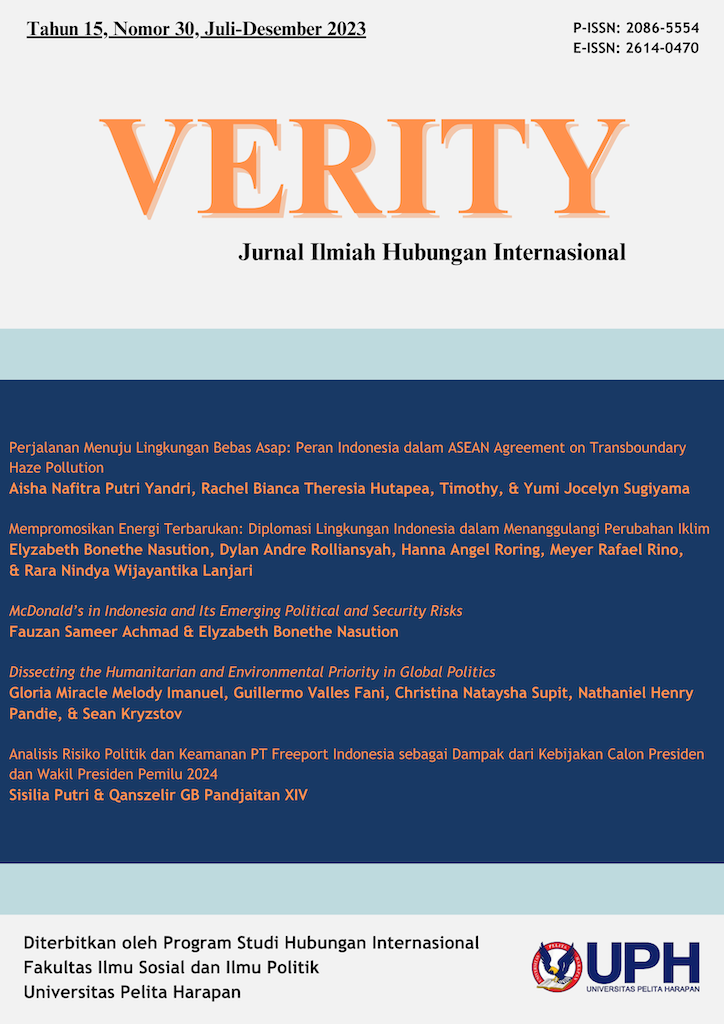Perjalanan Menuju Lingkungan Bebas Asap: Peran Indonesia dalam ASEAN Agreement on Transboundary Haze Pollution [The Road to a Haze-Free Environment: Indonesia's Role in ASEAN Agreement on Transboundary Haze Pollution]
DOI:
https://doi.org/10.19166/verity.v15i30.8170Λέξεις-κλειδιά:
ASEAN, Diplomacy, Environment, Haze Pollution, IndonesiaΠερίληψη
This paper examines Indonesia's participation dynamics since ratifying the ASEAN Agreement on Transboundary Haze Pollution (AATHP) and its contributions to environmental diplomacy. It delineates two main areas: bureaucratic/technical diplomacy and political leadership diplomacy. At the bureaucratic level, Indonesia has engaged significantly in international forums, notably by elevating the haze pollution issue in the ASEAN Ministerial Meetings on Environment and collaborating with Singapore on technological solutions. However, at the political leadership level, Indonesia's focus on international performance, as evidenced by the new Capital city Nusantara project, has hindered the effective implementation of AATHP principles domestically. Recommendations for AATHP and Indonesia's future contributions include expanding the role of Non-Governmental Interests (NGIs) to enhance treaty legitimacy, balancing scientific and political enforcement, and promoting media involvement for public awareness and scrutiny. By adopting these recommendations, Indonesia and ASEAN nations can effectively mitigate transboundary haze pollution in Southeast Asia.
Αναφορές
Ali, S. H. (2004). Conflict resolution and consensus building: applications to the small-scale mining sector. Paper presented at the CASM AGM, Colombo, Sri Lanka, October. Ali, S. H. & Vladich, H. V. (2016). Environmental Diplomacy. In C. M. Constantinou, P. Kerr & P. Sharp (Eds.), The SAGE Handbook of Diplomacy (pp. 601-614). London, England: SAGE Publications Ltd. ASEAN. (2021). ASEAN Agreement on Transboundary Haze Pollution. Kuala Lumpur, Malaysia: ASEAN. https://asean.org/wp-content/uploads/2021/01/ASEANAgreementonTransboundaryHazePollution-1.pdf. ASEAN. (2023). 17th ASEAN Ministerial Meeting on the Environment and the 18th Meeting of the Conference of the Parties to the ASEAN Agreement on Transboundary Haze Pollution. ASEAN Media Release. https://asean.org/media-release-of-17th-asean-ministerial-meeting-on-the-environment-and-18th-meeting-of-the-conference-of-the-parties-to-the-asean-agreement-on-transboundary-haze-pollution/. Benedick, R. E. (1999). Diplomacy for the Environment. Environmental Diplomacy, 3-12. American Institute for Contemporary German Studies. https://aicgs.org/wp-content/uploads/2011/11/environmentaldiplomacy.pdf. Bhwana, P.G. (2023). Haze Pollution Concerns, Ministry Says Indonesian Govt Uses Open Data in Addressing It. Tempo. https://en.tempo.co/read/1781239/haze-pollution-concerns-ministry-says-indonesian-govt-uses-open-data-in-addressing-it. Chariri, A. (2009). Landasan Filsafat Dan Metode Penelitian Kualitatif. Fakultas Ekonomi Universitas Diponegoro Semarang. Fadli, M. R. (2021). Memahami desain metode penelitian kualitatif. Kajian Ilmiah Mata Kuliah Umum, 21(1), 33-35. http://dx.doi.org/10.21831/hum.v21i1.38075. Febriyani, N. (2019). Analisis Kebijakan Indonesia Terkait Penundaan dalam Meratifikasi ASEAN Agreement on Transboundary Haze Pollution (AATHP) Tahun 2002-2014. Jurnal Studi Diplomasi dan Keamanan, 2(2), 73-84. Gabungan Pengusaha Kelapa Sawit Indonesia (GAPKI). (2018, January 18). Perkembangan Mutakhir Industri Minyak Sawit Indonesia. Gapki.Id News. https://gapki.id/news/2018/01/17/perkembangan-mutakhir-industri-minyak-sawit-indonesia/. Hasan, M.I. (2002). Pokok-pokok Materi Metodologi Penelitian dan Aplikasinya. Ghalia Indonesia. Kingsbury, B. (1998). The Concept of Compliance as a Function of Competing Conceptions of International Law. Michigan Journal of International Law, 19(2). Narain, S. (1999). Environmental Diplomacy in an Unequal World. Environmental Diplomacy, 17-25. American Institute for Contemporary German Studies. https://aicgs.org/wp-content/uploads/2011/11/environmentaldiplomacy.pdf. Raustiala, K. (2000). Compliance & Effectiveness in International Regulatory Cooperation. Case Western Reserve Journal of International Law, 32(3). Robertua, V., & Sigalingging, L. (2019). Indonesia Environmental Diplomacy Reformed: Case Studies of Greening ASEAN Way and Peat Restoration Agency. Andalas Journal of International Studies, 8(1). Siddiqui, M. R., & Quah, E. (2004). Transboundary haze pollution in Southeast Asia: Sustainable development and cooperative policy approaches. Environmental Development and Sustainability, 6(3), 20. Suryani, A. S. (2012). Penanganan Asap Kabut Akibat Kebakaran Hutan di Wilayah Perbatasan Indonesia. Jurnal DPR RI, 03(01). Young, O. R. (1999). The Effectiveness of International Environmental Regimes: Casual Connections and Behavioral Mechanisms. MIT Press.
Λήψεις
Δημοσιευμένα
Τεύχος
Ενότητα
Άδεια
Authors who publish with this journal agree to the following terms:
1) Authors retain copyright and grant the journal right of first publication with the work simultaneously licensed under a Creative Commons Attribution License (CC-BY-SA 4.0) that allows others to share the work with an acknowledgement of the work's authorship and initial publication in this journal.
2) Authors are able to enter into separate, additional contractual arrangements for the non-exclusive distribution of the journal's published version of the work (e.g., post it to an institutional repository or publish it in a book), with an acknowledgement of its initial publication in this journal.
3) Authors are permitted and encouraged to post their work online (e.g., in institutional repositories or on their website). The final published PDF should be used and bibliographic details that credit the publication in this journal should be included.


